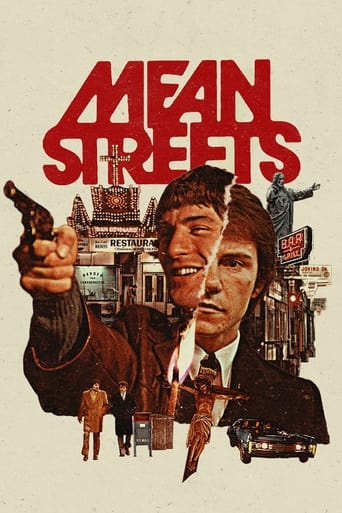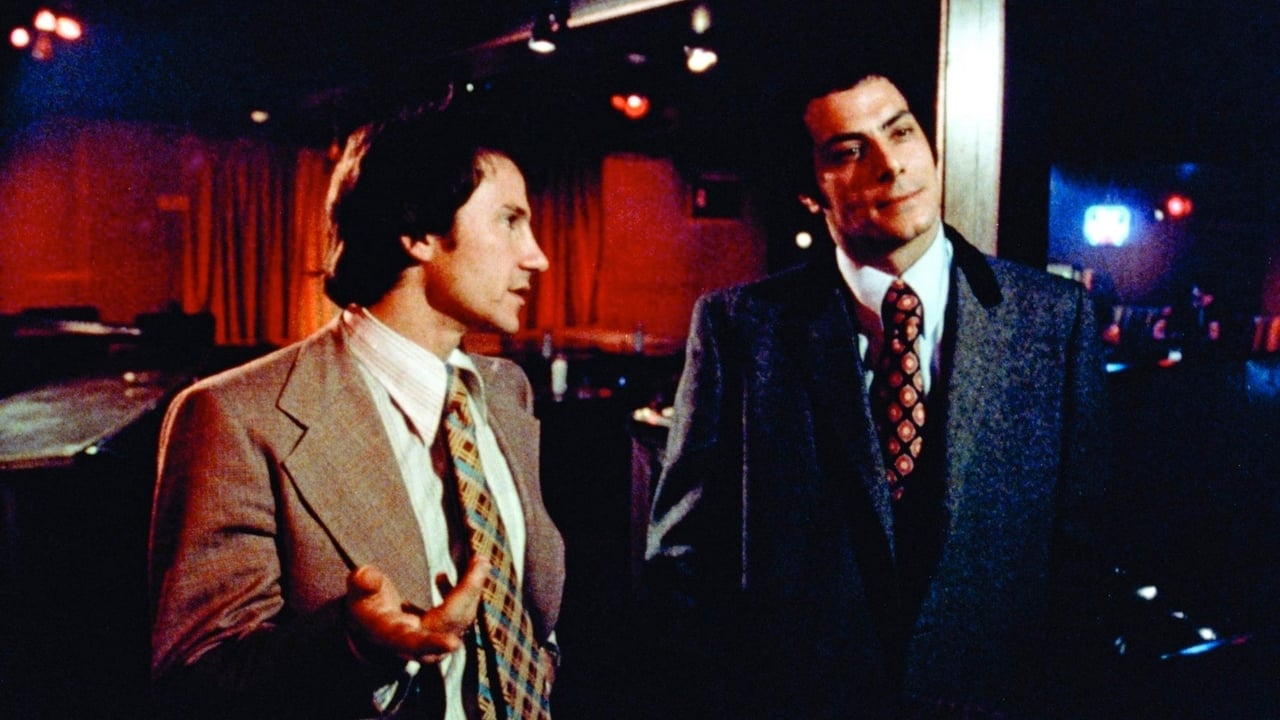pabloliveshere
I'm going to give this review exactly the amount of time the film deserves, i.e. not much.I sat through about 40 minutes of this and came to two conclusions - 1, it's boring in a dreary, uneventful way, and 2, the sound design is all over the place, with much of the dialogue lost to music.I didn't care about any of the characters, and the pool-hall fight sequence was laughably bad in terms of choreography.This is a classic?!?! What, because it's made by a certain director and stars certain actors?
gab-14712
People who know me very well know that I am a huge Martin Scorsese fan. Along with Steven Spielberg, Scorsese is probably my favorite all-time director. He made so many memorable classics that are worth watching over and over again with films like Taxi Driver and Goodfellas. However, I'm sad to report that Mean Streets is not one of those classics. At least not for me. It was a very well-received movie, but after watching it two times I couldn't figure out why people were over the moon about the film. It's not a bad film, but it is mostly boring. The acting is great and there are several fun scenes, but this is one of Scorsese's lesser efforts. I can't hold it against him because this film is his first feature project he had a say in. As a young filmmaker, this film shows he was still learning his craft. That being said, he manages to introduce the world to his style of directing and although I'm not the biggest fan of the movie, its still a solid movie debut for a first-time director.Charlie (Harvey Keitel) feels like he does not have much of a future. He works as a small-time hood for his uncle in the mean streets of New York City's Little Italy. His job is to collect payments and to reclaim debts. However, he doesn't have the personality to succeed in this role because he is way too much of a nice guy. His uncle disapproves of the people he hangs around with: his lover with an epilepsy problem and a crazy friend always in debt named Johnny Boy (Robert De Niro). Johnny's troubled soul finds near-catastrophic problems for everyone, and these problems escalate after Charlie and Johnny Boy failed to escape to Brooklyn.One thing that really worked in this movie's favor is the acting. I cannot be surprised because there are two actors here whom went on to have amazing careers and quite frankly, one of them is ranked among the all-time greats. Of course, I'd be talking about Harvey Keitel and Robert De Niro. Harvey Keitel made his character very believable and I felt like he was such a nice guy. He stuck by his friends despite constant pressure from his uncle, the leader of the local mafia. He really gave a deep, heartfelt performance that relies upon traditional values such as love and religion. De Niro, quite possibly, may delivered the best performance in the film. I loved his crazy, energetic performance. The man even started fights because that was just who he was. This performance shows what kind of future De Niro had in store for him.Another thing I liked is the realism Scorsese tried to portray in the film. He grew up in the area so it was cool for him to make this movie on a more personal level. Growing up in Little Italy was not always fun, according to Scorsese. The movie often shows that it was not all fun and games. I liked how he attempted to add some honesty to this picture. Another thing that I liked is the soundtrack. The use of rock songs, and only rock songs was something rare in cinemas at this time. But films were increasingly taking this route of using rock music as their soundtracks. It's common nowadays, but it was almost a revelation back in the day.Despite some good intentions and more of an intimate picture, I personally did not feel like Mean Streets was a great movie. It has some good moments such as that entertaining bar fight scene, but I felt bored more often than not. Remember, Scorsese is one of my favorite directors but I felt underwhelmed with his first motion picture he had a say in. I liked the acting, the music, and the overall effort Scorsese put into the film. I felt I learned a little more about life in Little Italy. I understand many people love this film, but movies are subjective. It was not a great film, but it is certainly better than many other first-time directorial efforts. All we need is just a little experience and seasoning, and we will be in good shape.My Grade: C+
pedroborges-90881
A amazing movie that talk about friends, family, business, and conflicts over religion.Scorsese capture in a excellent way the New York of that time and also start to show the world what he could do, and Robert De Niro steal all the scenes he was in, giving one of his best performances in his career at a time when few people know who he was. Harvel Keitel also give a good performance as a man in conflict with his attitudes, his work and the prejudices of the time.One of the best films of the 70's and a masterpiece of cinema with one of the best director and actor of all time.
sharky_55
If you find yourself frustrated that even as Johnny Boy keeps messing up Charlie still keep embracing and protecting him, Scorsese has succeeded. In more ways than one this is the rougher, meaner prototype of Goodfellas - but instead of glamourising the gangster lifestyle Scorsese plays it for what it is, and doesn't evoke any unnecessary personal growth. We see Charlie's catholic roots long before they thrust him into moral ambiguity and conflict, and we can immediately tell he has the a sort of intense responsibility for the members of his family that drive him to increasingly wave away their transgressions or faults. Even as they drive to what seems to be certain death, they are like a little family on a road-trip, laughing and joking with each other in the car as if nothing was wrong in the world. Scorsese has drawn on his own experiences of growing up in Little Italy to provide a rich canvas of characters and quarrels that unfold naturally within this world. While Goodfellas was immaculately structured with even freeze-frames to highlight define moments in the narrative, Mean Streets is polar opposite, with incidents and periods of inactivity peppering the anxious survival of Charlie's family and his aspirations in the Mafia. Fights might break out while you watch a show at the club. A man at the urinal might be shot in the back without notice. These acts of brutality and violence are heralded by an operatic score that gradually normalises their graphic nature. The real scare for Charlie is his off-cuff friend Johnny Boy, who makes his initial entrance into a hazy, crimson lit bar on the backdrop of The Rolling Stones' Jumpin' Jack Flash. The moment is magnified in the slow motion and Scorsese pushes into to the wary Keitel as if to say 'look here, trouble comes'. If his Catholicism hadn't already been compromised, it was now. Then he disappears for a good part of an hour and all we hear are whispers of his increasingly erratic behaviour, dodging loan sharks and spurning the lowly job that Charlie had worked so hard to get him. He finds him drunken on the roof and firing off shots into the night, and the piercing sound of the bullets is so effective because the rest of the soundtrack is silent - each pull of the trigger further ramps up the anxiety of Charlie desperately trying to reign him in. Keitel is so key; his increasing anger and indignation at each of Johnny Boy's missteps is underscored by this shame and regret as if it was all his fault. There is a scene where they trade blows on the staircase and where they finally come to blows, but like fighting brothers it all becomes okay the next day. And we see that although Charlie is not afraid to let the profanities fly, he knows that a little slap is going too far. He is like a father that spanks their child but immediately regrets it. He mouths off at Teresa, then right away looks as if he needs to run off and place his palm over a flame. His tough guy persona doesn't have any heart to it. There's a sort of awareness of the cinematic gangster that Scorsese shows with the handling of these characters. Whilst they fire guns and hustle guys all day long, they back away and up onto furniture to avoid getting near a caged lion. As Charlie becomes enchanted with the epileptic Teresa, he refrains from saying those three words because they represent sin and weakness and his uncle would forbid it. She replies with more smarts than expected: "Your reputation's safe", but it doesn't ever drag into self-conscious or affectionate territory. He knows, and she knows, that Mean Streets is all about reputation, and how it is undercut by other ideas like love and loyalty and family. They are not easily reconciled.



 AD
AD








